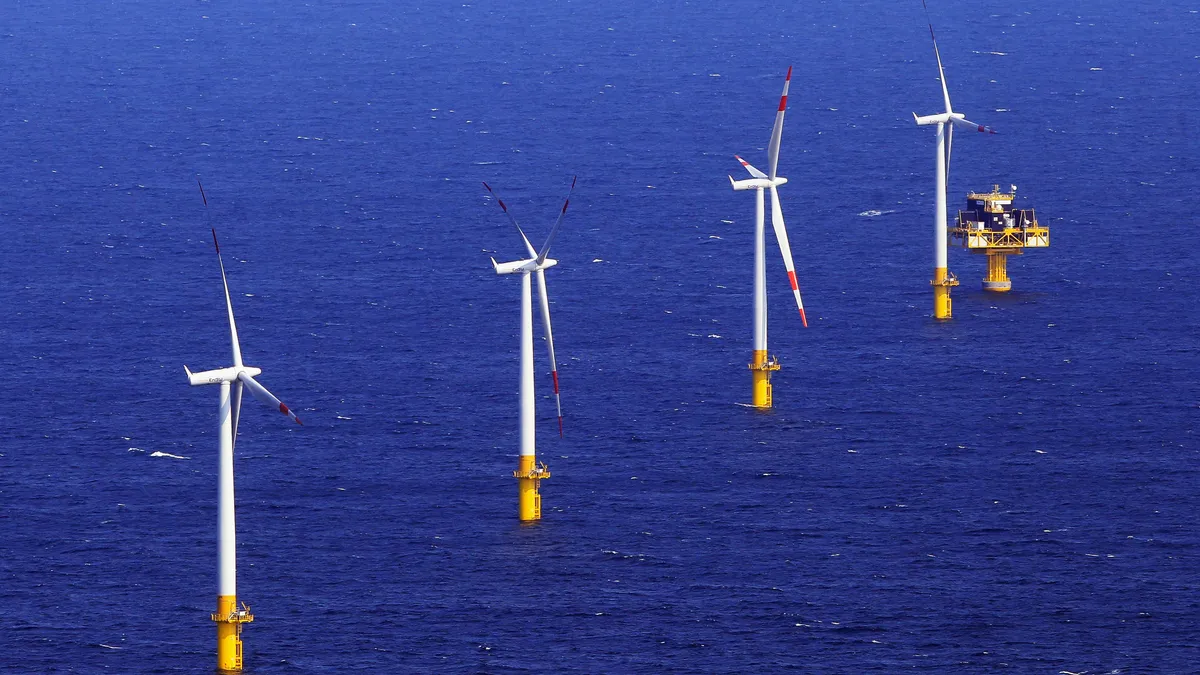UPDATE: Aug. 31, 2023: The Massachusetts Department of Energy Resources and the state’s electric distribution companies yesterday jointly issued a finalized version of their Request for Proposals for the state’s fourth offshore wind solicitation, which seeks up to 3,600 MW of projects. The final RFP aims to “allow for additional flexibility” in submitted proposals to account for the economic headwinds facing the offshore wind industry, and lets bidders submit an “alternative indexed pricing proposal intended to reduce risk to ratepayers and bidders.” The RFP also requires bidders detail how their bids would use federal tax credits to lower costs, and provides scheduling flexibility in case IRS guidance for the Inflation Reduction Act is announced late in the bid preparation timeline.
Dive Brief:
-
The Massachusetts Department of Energy Resources and the state’s electric distribution companies filed a draft Request for Proposals on Tuesday that seeks up to 3,600 MW of offshore wind projects.
-
If approved by the Massachusetts Department of Public Utilities, the RFP will be the state’s largest procurement of offshore wind energy. The procurement could supply 25% of the state’s annual electricity demand, according to the DOER.
-
However, the filing has raised questions about additionality and whether some of the 3,600 MW will go to companies looking to re-bid existing projects they say are no longer financially viable.
Dive Insight:
DOER is scaling up its renewable energy ambitions—and perhaps looking to recoup some of the losses associated with growing financial strain in the offshore wind industry.
The RFP calls for significantly more offshore wind energy than the state has sought in prior solicitations. The state’s most recent round of procurement, its third, sought 1,600 MW of offshore wind.
“We are excited to announce the first offshore wind procurement of our administration—the biggest in our region’s history,” said Gov. Maura Healey, who took office in January. “This draft RFP is a signal to the rest of the world that Massachusetts is all-in on offshore wind and ready to be the industry’s hub. Our proposal is also a commitment to Massachusetts ratepayers to chase after all clean energy for our homes and businesses.”
The RFP aims to max out the DOER’s statutory authority to procure offshore wind energy, according to the agency. The 1,200 MW Commonwealth offshore wind farm owned by AVANGRID is currently tied up in court pending an appeal of a ruling that approved the development despite evidence submitted by the wind farm that the project was no longer financially viable.
Absent that project, Massachusetts currently has 2,000 MW of offshore wind under contract and authority to procure up to 5,600 MW, according to the DOER.
The new RFP will allow bidders to use indexed pricing to increase the flexibility of future projects, although details of the index have yet to be released, according to the DOER. Bidders must also explain how their projects will benefit economic development in Massachusetts, including environmental justice initiatives, and should explain how they’d make use of available grants, tax credits and other government incentives, the draft RFP said. The RFP anticipates a due date of January 2024 for bids.
The draft RFP was well-received by offshore wind industry officials. AVANGRID spokesperson Craig Gilvarg commended the governor’s office for “its commitment to building a robust offshore wind industry in the Commonwealth.” In response to questions about whether the RFP might present an opportunity to re-bid the Commonwealth wind farm project, Gilvarg indicated that the company is reviewing the draft RFP.
Carol Oldham, northeast director at the Business Network for Offshore Wind, also praised the solicitation.
“Massachusetts ... joins a growing list of states that [is] making bold commitments to offshore wind this year that will drive substantial new investments into the U.S. manufacturing sector and foster development of a sustainable supply chain,” she said.













